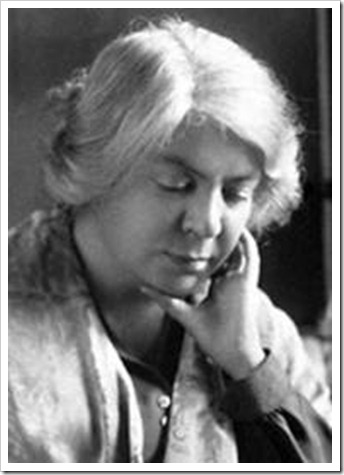Grazia Deledda Posted by Serena on Mar 8, 2013 in Uncategorized
Today, the 8th of March, we celebrate la Festa della Donna (International Women’s Day), and as is now my tradition, I’m going to dedicate today’s blog to a famous Italian woman. In the past I have written about educationalist Maria Montessori, and artist Artemisia Gentileschi, today’s blog is about the writer Grazia Deledda.
Grazia Deledda was born in Nuoro, Sardinia into a middle-class family, on the 27th of September 1871. As was customary for women at that time, she attended elementary school and was then educated by a private tutor (a guest of one of her relatives), before moving on to study literature on her own. In particular, she read the Bible, and French and Russian novelists such as Balzac, Hugo, Tolstoy and Dostoyevsky. Deledda started writing very young, her first short stories and poems being published in females fashion magazines in Sardinia and in Rome, and soon her work began to gain critical interest.
In 1900 she married a functionary of the Ministry of War, and moved to Rome where she lived for the rest of her life. It was whilst living there that she published her most important novels: “Elias Portolu” (1903), “Cenere” (1904), “Canne al vento” (1913, considered her masterpiece), “Marianna Sirca” (1915), and “La Madre” (1920). Almost all her works are set in the harsh landscapes of her native Sardinia, where her characters struggle with love, pain and death, imbued with a sense of sin and inevitable destiny.
The following quote from the Sicilian writer Luigi Capuana perfectly sums up the emotions that Deledda’s writings evoke in me: “Il lettore, chiuso il libro, conserva vivo il ricordo di quelle figure caratteristiche, di quei paesaggi grandiosi; e le impressioni sono così forti che sembrano quasi immediate, e non di seconda mano” (The reader, once he/she has closed the book, is left with a lively memory of those distinct characters, of those magnificent landscapes; and the impressions are so strong that they seem almost direct, rather than second hand)
Her works have been translated into several languages, and amongst her admirers were the Russian writer Maxim Gorky, and the British novelist D.H. Lawrence, who in 1928 wrote the introduction to the English translation of Deledda’s novel “La Madre”. In 1926 she was awarded the Nobel Prize for Literature "for her idealistically inspired writings which with plastic clarity picture the life on her native island and with depth and sympathy deal with human problems in general".
Grazia Deledda died in 1936 in Rome, and her last work, “Cosima”, an autobiographical novel, was published posthumously in 1937.
To give a small idea of Deledda’s writing, here is one of her poems:
Cade Una Foglia
Cade una foglia che pare
tinta di sole, che nel cadere
ha l’iridescenza di una farfalla;
ma appena giunta a terra
si confonde con l’ombra, già morta.
A Leaf Falls
A leaf falls, seemingly
painted by sunlight, and falling
has the iridescence of a butterfly;
but as soon as it lands upon the ground
it is lost in the shadow, already dead.

Build vocabulary, practice pronunciation, and more with Transparent Language Online. Available anytime, anywhere, on any device.





Comments:
andreas:
Ciao Serena!
Siccome studio profondamente l’italiano, leggero’ sen’altro le sue opere.
E non so se la Sardegna sia ‘harsh’. Solo l’ho vista nel film ‘Magnifica Italia’, e posso dire che e’ proprio bella. Mi interessano particolarmente gli edifici nuragici. Che cultura misteriosa! Non si puo’ leggerci quasi nulla.
Saluti da Andreas
Gino:
All of her work is available in Italian, at no charge, in pdf format at http://www.liberliber.it/libri/d/deledda/index.htm
andreas:
Salve Gino!
Grazie per il suggerimento.